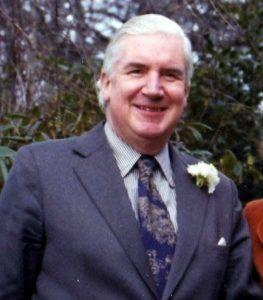
Professor Emeritus James Robson, a former President of the Renal Association, who died on March 14th 2010 at the age of 88, was one of the pioneers of haemodialysis in Britain, and a distinguished physician and clinical scientist.
Born in Hawick in 1921, he came to Edinburgh to study Medicine at the outbreak of war in 1939. Three years later he was awarded a prestigious Rockefeller Foundation Studentship and sailed to America to complete his medical training. The ship was torpedoed off the Canadian Coast and he was one of the survivors. He eventually reached New York University, the academic home of Homer Smith, where he completed his medical course and in 1944 graduated MD. Thereafter, he worked for a short time in the wards and laboratories of Bellevue Hospital where he was introduced to clinical research. He subsequently completed his medical studies in Edinburgh and was awarded the degrees of MB ChB with Honours in 1945 and MD with Commendation only 18 months later for his thesis on the causal factors of fluid retention in chronic liver disease.
From 1945 to 1948 he served as a Captain with the RAMC in India, Palestine and Egypt alongside Douglas Black and Paul Fourman. After demobilisation he worked for some months with Dr C. P. Stewart in the Clinical Chemistry laboratories at the Royal Infirmary of Edinburgh and, until Dr Stewart retired, they collaborated in the investigation of metabolic problems and supervised PhD students. In 1949 he was awarded a Rockefeller Travelling Fellowship, which he held in the Department of Biochemistry and Nutrition at Harvard.
During the next decade he combined work in clinical medicine with teaching and research. In association with C.P. Stewart and others, including Hugh Dudley and Anne Lambie, he carried out studies on the measurement of GFR and renal plasma flow using a single injection technique, studies of the renal concentrating mechanism, the metabolic response to surgery, the action of diuretics and the conservative management of patients with end-stage renal failure.
With his wife, Dr Mary MacDonald, a pathologist, he set up a renal biopsy service for diagnostic and research purposes. Their studies were among the earliest to reveal the electron microscopic changes in the glomeruli in different forms of glomerulonephritis and pre-eclampsia. They also reported one of the first observations on the effect of steroid therapy in minimal lesion glomerulonephritis. As a result of their experience in this field Dr. Robson and Dr. MacDonald played an important role in the establishment of MRC trials in the treatment of glomerulonephritis.
The Acute Renal Failure Service, which James Robson set up in 1959, was one of the first in Britain and called for unprecedented collaboration among the medical, nursing and laboratory services. It resulted in an immediate 50% reduction in the mortality from severe acute renal failure and paved the way for the first successful renal transplant in Britain, which was performed in 1960 by Professor Sir Michael Woodruff. Dr Robson played an important part in the pre-operative and post-operative management of the first patients to receive renal transplants.
In 1964, intermittent dialysis was set up by James Robson and his colleagues. Five years later an outbreak of viral hepatitis occurred which resulted in a number of deaths. Investigations by the bacteriologists Professor Marmion and Dr Tonkin led to the discovery of the means of spread, enabling Dr Robson and his two expert advisers to devise a code of practice for dialysis units, which largely formed the basis of the advice given in the Report of the Government Advisory Group, chaired by Lord Rosenheim, on Hepatitis and the Treatment of Chronic Renal Failure. During this time James Robson initiated and supervised research into a range of subjects. These included dialysis disequilibrium, acid base balance, glomerulonephritis, proteinuria, aluminium intoxication (in patients treated by intermittent dialysis) and the control of hospital infection.
In 1962 he returned to Harvard for a short time as an Honorary Associate Professor and in 1968 was the Merck Sharp and Dohme Visiting Professor in Australia; he was subsequently made an Honorary Member of the Australasian Society of Nephrology. He was appointed to the Chair of Medicine in Edinburgh in 1977 and in the same year became President of the Renal Association in London. He was a natural leader, an excellent clinician and an outstanding teacher. The Renal Unit attracted able young men and women who were trained by him in clinical practice and research methods. Some became renal physicians and several became professors of nephrology.
Before and after becoming Professor of Medicine, he played a leading part in the revision of the Undergraduate Medical Curriculum in Edinburgh. For many years he contributed chapters to Davidson’s Principles and Practice of Medicine, and in association with Reg Passmore, he became Editor-in-Chief of A Companion to Medical Studies, one of the most comprehensive and successful medical text books of its time. In retirement he contributed articles on his special interests in medicine and science to The New Encyclopaedia Britannica.
James Robson was a knowledgeable and amusing companion whose wide range of interests included, gardening, literature, music, and contemporary art. He was a popular member of Edinburgh’s New Club where his well-informed opinions on politics and current affairs invariably attracted attention.
Over the last few years his health deteriorated and he was unable to walk. With the devoted attention of his wife and community support he was, however, able to stay at home. James Robson died quietly at home following a period of hospitalisation. He is survived by his wife, Mary MacDonald, and two sons, one a doctor.